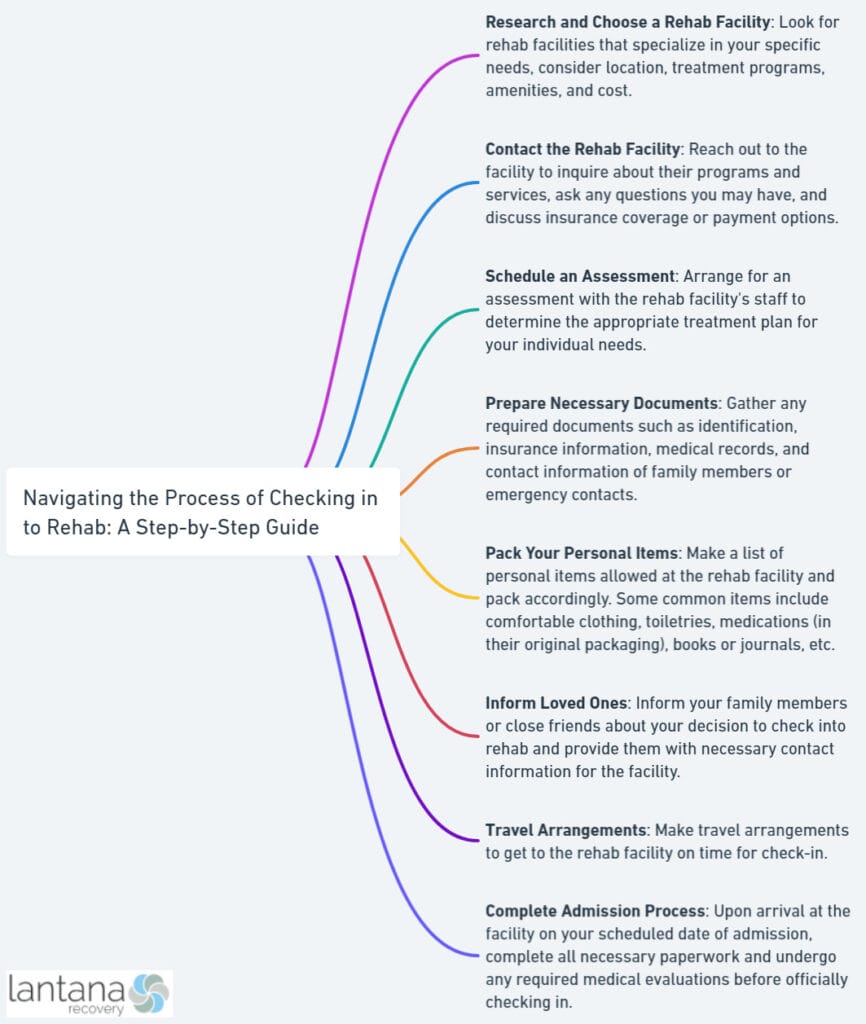Embarking on a journey to recovery through rehab is a courageous and life-changing decision. It’s essential to be well-prepared, both mentally and practically, to make the most of this opportunity for healing and growth. In this blog post, we’ll guide you through the crucial steps to take before checking in to rehab, the importance of finding the right treatment center, and how to navigate the challenges you may face along the way. Get ready to embark on a transformative path to lasting sobriety!
Key Takeaways
- Recognize the importance of rehab to address addiction and provide support for substance abuse treatment.
- Prepare financially, socially and logistically before entering rehabilitation.
- Manage emotions, expectations and stay connected with loved ones during recovery journey for lasting sobriety.
Understanding the Importance of Checking in to Rehab
Rehabilitation plays a pivotal role in tackling addiction and improving overall well-being. Attendance at an addiction treatment center offers individuals a deeper understanding of their addiction, equips them with coping strategies, and guides them towards a healthier lifestyle. The Substance Abuse and Mental Health Services Administration recognizes the importance of rehab in overcoming substance use disorder and providing support for substance abuse treatment and mental health conditions.
State regulations may cause variations in the process of involuntary commitment to rehab. Typically, it necessitates assessment by a medical professional and certification in writing that the individual requires drug and alcohol abuse treatment. For those without health insurance, exploring alternatives and seeking assistance, such as the Affordable Care Act, sliding fee scales, and recommendations from the mental health services administration, can facilitate access to rehab.
Preparing for Your Stay in Rehab
Certain preparatory steps are necessary before entering rehab to ensure a seamless transition into treatment. Proper preparation includes making financial arrangements, informing your social circle, packing for rehab, and addressing any outstanding matters at home.
Focusing on the anticipated outcome and the benefits of positive lifestyle changes during substance use disorder treatment can empower you to commence your recovery journey with confidence.

Informing Family and Friends
Communicating your decision to enter rehab to family and friends is key to garner their support and understanding. This support can facilitate the process of entering rehab, making it more successful. Choose a peaceful and secluded setting to have a conversation with your loved ones without interruption.
The acquisition of support from family and friends is of great importance as it can facilitate the process of entering rehabilitation, as well as provide motivation and encouragement during recovery. Involving your loved ones in your journey creates a robust support network for you during tough times.
Handling Work and Medical Leave
Notifying your employer about your rehabilitation stay is crucial to secure legal protection for medical leave and avoid job dismissal. COBRA (Consolidated Omnibus Budget Reconciliation Act) can assist in covering the cost of rehabilitation by offering the same coverage that was available before employment, including any mental health and substance misuse treatment included in the insurance plan.
You may be eligible to maintain your insurance after losing your job if your employer lets you know. Enrolling in COBRA is one way to do this. You have a reasonable amount of time to make your decision. 60 days is the minimum you can take to decide whether to continue your coverage. Once you opt for COBRA, you’ll be responsible for paying the entire amount of your premium, which was previously covered by you and your employer.
Resolving Legal and Financial Matters
Resolving legal and financial issues before entering rehab is imperative to ensure undistracted focus on recovery. Typical financial difficulties encountered during rehab may include hospital bills, lost wages, and financial strain due to rehab costs. Legal considerations may involve potential consequences on ongoing court cases, custody battles, and employment discrimination.
To ensure financial obligations are fulfilled during rehab, consider setting up automatic payments or entrusting a reliable friend or family member to handle payments on your behalf. Preemptively managing legal and financial issues enables you to concentrate on your recovery with tranquility.
Choosing the Right Treatment Center for Your Needs

Identifying a suitable treatment center offering a program that best serves your needs is the initial step before checking into rehab. The choice between intensive outpatient treatment and inpatient rehab depends on the severity of your addiction and your individual needs.
When selecting a rehab center, consider the following factors:
- The type of treatment needed
- Accreditation
- Location
- Treatment programs
- Cost
- The professionalism of the staff
Use these criteria to assess the quality of potential rehab centers and choose the most suitable one to ensure a successful recovery.
Packing Essentials and Prohibited Items

Prior to packing for rehab, determine which items are allowed and which are to be left at home. Bring only the essentials for your stay, as many common items may not be allowed in rehab facilities.
The rehab center, also known as a treatment facility, will provide an inventory of items not allowed, helping you pack accordingly and avoid any complications upon arrival. By understanding the facility’s rules and regulations, you’ll be better prepared to begin your treatment journey smoothly.
Adjusting to Your New Environment
Adaptation to the rehab environment is a vital component of successful recovery. Familiarity with the rehab environment can offer a sense of comfort and serenity, contribute to a patient’s sense of control and optimism, and accelerate the healing process. Establishing a daily routine during rehab, such as attending therapy sessions and group activities, can help you adapt to your new environment more easily.
Embrace your new environment and engage in the various programs available at the alcohol rehab facility, including alcohol addiction treatment. This proactive approach to your recovery will help you build a strong foundation for lasting sobriety and personal growth.
Navigating the Intake Process

On admission to rehab, an initial evaluation is performed to identify your treatment needs. During this evaluation, it’s vital to respond truthfully to questions concerning your addiction and treatment history. The intake process will also inform you of expectations for rehabilitation.
Once the initial assessment is complete, acclimatize to your new environment and familiarize yourself with the rehab facility’s rules and regulations. This will help you feel more comfortable and prepared to engage fully in your treatment program.
Engaging in Treatment Programs and Therapy Sessions
Active participation in diverse treatment programs and therapy sessions is key to fully harness your recovery potential in drug or alcohol rehab. Typical therapies employed in typical drug and alcohol rehab programs like our Charleston drug rehab include:
- Cognitive Behavioral Therapy (CBT)
- Group Therapy
- Individual Therapy
- Family Therapy
- Motivational Interviewing
- Dialectical Behavior Therapy (DBT)
Therapy sessions play an integral role in the recovery process of drug abuse and drug or alcohol addiction, aiding individuals in gaining insight into the root causes of their addiction, devising coping mechanisms, and handling concurrent mental health issues. By engaging in these treatment programs and therapy sessions, you’ll be better equipped to overcome addiction and achieve lasting sobriety.
Managing Emotions and Expectations
Rehab may bring about feelings of anxiety, depression or emotional distress, which can be similar to withdrawal symptoms. Learning healthy coping strategies and managing emotions is vital to your recovery journey. De-stressing before entering rehab can help you approach treatment with a positive mindset.
Setting realistic expectations for your rehab journey is crucial for maintaining motivation and commitment to recovery. By focusing on self-care and understanding that recovery is an ongoing process, you’ll be better situated to handle the emotional ups and downs that may accompany rehab.
Staying Connected with Loved Ones
Keeping in touch with loved ones during rehab offers several benefits like emotional support, stimulation, and encouragement. It assists you in feeling connected to your support system and decreases feelings of isolation during treatment. However, be aware of the rehab facility’s communication policies and ensure that your electronic devices adhere to the rules.
Open and honest communication with your loved ones can help rebuild trust and connections that may have been strained due to addiction. By staying connected with your loved ones, you’ll foster a strong support system that will continue to encourage you throughout your recovery journey.
Planning for Life After Rehab

Creating plans for post-rehab life helps individuals work towards a substance-free future with clear goals and aspirations. Strategies for maintaining sobriety after leaving rehab include:
- Constructing a supportive network
- Participating in support groups
- Engaging in therapy or counseling
- Establishing healthy coping mechanisms
Identify and avoid situations, people, or places that may trigger cravings or temptations to use substances. By developing a comprehensive plan for life after rehab, you’ll set yourself up for continued success in maintaining sobriety and achieving personal goals.
Moreover, engaging in outpatient rehab immediately after completing an inpatient rehabilitation program can substantially enhance the chances of sustained recovery. Transitioning from an intensive, inpatient setting to outpatient care provides individuals with a seamless continuum of support, helping them navigate the challenges of reintegrating into daily life while maintaining a structured and therapeutic environment.
Outpatient programs offer ongoing counseling, group therapy, and access to various recovery resources, reinforcing the skills and coping mechanisms acquired during inpatient treatment. This immediate transition ensures that individuals remain connected to a supportive community, receive continued guidance, and actively apply the tools learned in inpatient rehab to real-life situations.
For more information, read our complete guide to outpatient drug rehab.
Summary
In conclusion, the process of checking into rehab can be a life-changing journey to recovery. By understanding the importance of rehab, preparing for your stay, choosing the right treatment center, and actively participating in therapy sessions, you can set yourself up for success. Managing emotions, staying connected with loved ones, and planning for life after rehab will further ensure lasting sobriety. Embrace this transformative path and take the first step towards a healthier, happier future.
Frequently Asked Questions
What does rehabilitation mean in drugs?
Rehabilitation in the context of drugs refers to a comprehensive program of treatment designed to help those suffering from addiction to reduce their drug and alcohol use, as well as develop skills to live without them. Through this process, recovery is possible.
What is the rehab phase of recovery?
The rehab phase of recovery involves controlling pain and swelling through a process of Rest, Ice, Compression and Elevation (RICE).
How can I choose the right rehab center for my needs?
When selecting a rehab center, consider your treatment needs, accreditation, location, treatment programs, cost and the professionalism of staff for the best fit for your needs.
What should I pack for rehab?
Pack light for your rehab stay, bringing only essential items that are allowed by the facility. Remember to adhere to all rules and regulations.
How can I stay connected with my loved ones during rehab?
Stay connected with your loved ones during rehab by following the facility’s communication policies and practicing open and honest communication. This will help you rebuild trust and foster strong connections.



